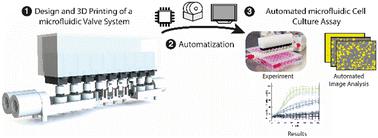Our official English website, www.x-mol.net, welcomes your
feedback! (Note: you will need to create a separate account there.)
Automation of cell culture assays using a 3D-printed servomotor-controlled microfluidic valve system
Lab on a Chip ( IF 6.1 ) Pub Date : 2022-11-07 , DOI: 10.1039/d2lc00629d Steffen Winkler 1 , Jannik Menke 1 , Katharina V Meyer 1 , Carlotta Kortmann 1 , Janina Bahnemann 2
Lab on a Chip ( IF 6.1 ) Pub Date : 2022-11-07 , DOI: 10.1039/d2lc00629d Steffen Winkler 1 , Jannik Menke 1 , Katharina V Meyer 1 , Carlotta Kortmann 1 , Janina Bahnemann 2
Affiliation

|
Microfluidic valve systems show great potential to automate mixing, dilution, and time-resolved reagent supply within biochemical assays and novel on-chip cell culture systems. However, most of these systems require a complex and cost-intensive fabrication in clean room facilities, and the valve control element itself also requires vacuum or pressure sources (including external valves, tubing, ports and pneumatic control channels). Addressing these bottlenecks, the herein presented biocompatible and heat steam sterilizable microfluidic valve system was fabricated via high-resolution 3D printing in a one-step process – including inlets, micromixer, microvalves, and outlets. The 3D-printed valve membrane is deflected via miniature on-chip servomotors that are controlled using a Raspberry Pi and a customized Python script (resulting in a device that is comparatively low-cost, portable, and fully automated). While a high mixing accuracy and long-term robustness is established, as described herein the system is further applied in a proof-of-concept assay for automated IC50 determination of camptothecin with mouse fibroblasts (L929) monitored by a live-cell-imaging system. Measurements of cell growth and IC50 values revealed no difference in performance between the microfluidic valve system and traditional pipetting. This novel design and the accompanying automatization scripts provide the scientific community with direct access to customizable full-time reagent control of 2D cell culture, or even novel organ-on-a-chip systems.
中文翻译:

使用 3D 打印伺服电机控制的微流体阀系统实现细胞培养分析的自动化
微流体阀系统在生化分析和新型片上细胞培养系统中显示出自动混合、稀释和时间分辨试剂供应的巨大潜力。然而,这些系统中的大多数都需要在洁净室设施中进行复杂且成本密集的制造,并且阀门控制元件本身也需要真空或压力源(包括外部阀门、管道、端口和气动控制通道)。为了解决这些瓶颈,本文提出的具有生物相容性和可热蒸汽灭菌的微流体阀系统是通过高分辨率 3D 打印一步法制造的——包括入口、微混合器、微阀和出口。3D 打印的阀膜通过偏转使用 Raspberry Pi 和定制的 Python 脚本控制的微型片上伺服电机(导致设备成本相对较低、便携且完全自动化)。虽然建立了高混合精度和长期稳健性,但如本文所述,该系统进一步应用于概念验证分析,用于通过活细胞成像监测小鼠成纤维细胞 (L929) 自动测定喜树碱的IC 50系统。细胞生长和IC 50的测量值显示微流体阀系统和传统移液器之间的性能没有差异。这种新颖的设计和随附的自动化脚本为科学界提供了直接访问 2D 细胞培养的可定制全时试剂控制,甚至是新颖的片上器官系统。
更新日期:2022-11-07
中文翻译:

使用 3D 打印伺服电机控制的微流体阀系统实现细胞培养分析的自动化
微流体阀系统在生化分析和新型片上细胞培养系统中显示出自动混合、稀释和时间分辨试剂供应的巨大潜力。然而,这些系统中的大多数都需要在洁净室设施中进行复杂且成本密集的制造,并且阀门控制元件本身也需要真空或压力源(包括外部阀门、管道、端口和气动控制通道)。为了解决这些瓶颈,本文提出的具有生物相容性和可热蒸汽灭菌的微流体阀系统是通过高分辨率 3D 打印一步法制造的——包括入口、微混合器、微阀和出口。3D 打印的阀膜通过偏转使用 Raspberry Pi 和定制的 Python 脚本控制的微型片上伺服电机(导致设备成本相对较低、便携且完全自动化)。虽然建立了高混合精度和长期稳健性,但如本文所述,该系统进一步应用于概念验证分析,用于通过活细胞成像监测小鼠成纤维细胞 (L929) 自动测定喜树碱的IC 50系统。细胞生长和IC 50的测量值显示微流体阀系统和传统移液器之间的性能没有差异。这种新颖的设计和随附的自动化脚本为科学界提供了直接访问 2D 细胞培养的可定制全时试剂控制,甚至是新颖的片上器官系统。











































 京公网安备 11010802027423号
京公网安备 11010802027423号